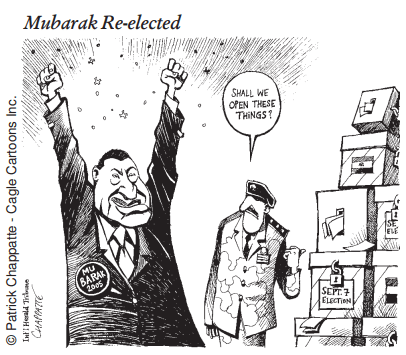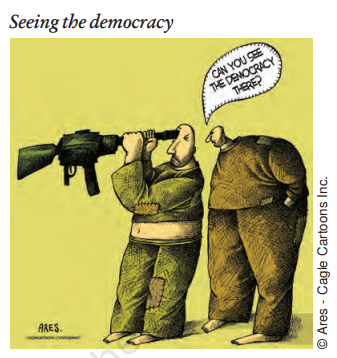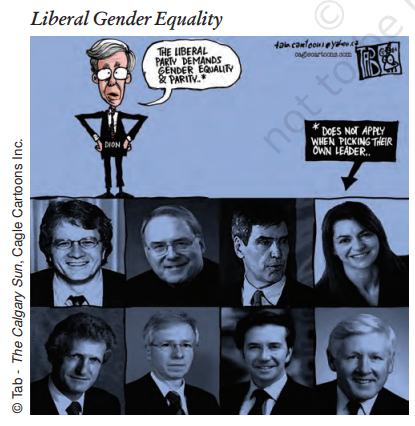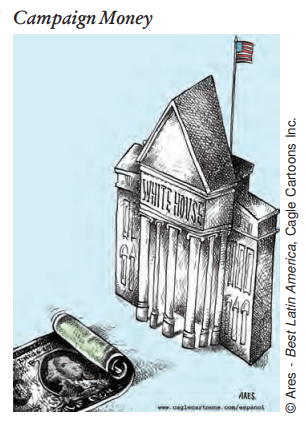NCERT Solutions for Class 10 Political Science Chapter 8 Challenges to Democracy Important Questions
Challenges to Democracy Important Question Answers – Given in this post is NCERT Solutions for Class 10 Political Science Chapter 8 Challenges to Democracy. The important questions we have compiled will help the students to brush up on their knowledge about the subject. Students can practice Class 10 Political Science important questions to understand the subject better and improve their performance in the board exam. The NCERT solutions provided here will also give students an idea about how to write the answers.
Related – MCQs for Class 10 Political Science Book Chapter 8 “Challenges to Democracy”
Multiple Choice Questions (1 Mark each)
Select the correct description of the challenges for democracy in given situations
- Mexico: Second free election after the defeat of PRI in 2000; defeated candidates allege rigging.
- To hold free and fair elections without any malpractices or influences
- To prevent the killings based on sects.
- To hold multiparty free and fair elections.
- To prevent the domination of majority
Answer – A. To hold free and fair elections without any malpractices or influences
- China: The Communist party adopts economic reforms but maintains a monopoly over political power.
- To hold free and fair elections without any malpractices or influence
- To prevent the killings based on sects.
- To hold multiparty free and fair elections.
- To prevent the domination of majority
Answer – C. To hold multiparty free and fair elections.
- Pakistan: General Musharraf holds referendum, allegations of fraud in the voter’s list.
- To hold free and fair elections without any malpractices or influence
- To prevent the killings based on sects.
- To hold multiparty free and fair elections.
- To eliminate fraud malpractices during referendum and elections.
Answer – D. To eliminate fraud malpractices during referendum and elections.
- Iraq: Widespread sectarian violence as the new government fails to establish its authority.
- To hold free and fair elections without any malpractices or influence
- To prevent the killings based on sects.
- To hold multiparty free and fair elections.
- To prevent the domination of majority
Answer – B. To prevent the killings based on sects
- South Africa: Mandela retires from active politics; pressure on his successor Mbeki to withdraw some concessions given to the white minority.
- To hold free and fair elections without any malpractices or influence
- To prevent the killings based on sects.
- To hold multiparty free and fair elections.
- To prevent the domination of majority
Answer – D. To prevent the domination of majority
- Choose the type of challenge being faced in the given situations.
- US, Guantanamo Bay: UN Secretary General calls this a violation of international law; US refused to respond.
- Foundational Challenge
- Challenge to deepening of democracy
- Challenge to expansion of democracy
- Foreign challenge
Answer – A. Foundational challenge
- Saudi Arabia: Women were not allowed to take part in public activities, no freedom of religion for the minority.
- Foundational Challenge
- Challenge to deepening of democracy
- Challenge to expansion of democracy
- Minority challenge
Answer – C. Challenge to expansion of democracy
- Yugoslavia: Ethnic tension between Serbs and Albanians on the rise in the province of Kosovo; Yugoslavia disintegrated.
- Foundational Challenge
- Challenge to deepening of democracy
- Challenge to expansion of democracy
- Societal challenge
Answer -C. Challenge too expansion of democracy
- Belgium: One round of constitutional change taken place, but the Dutch speakers not satisfied; they want more autonomy.
- Foundational Challenge
- Challenge to deepening of democracy
- Challenge to expansion of democracy
- Language challenge
Answer – B. Challenge to deepening of democracy
- Sri Lanka: Peace talks between the government and LTTE breaks down, renewed violence.
- Foundational Challenge
- Challenge to deepening of democracy
- Challenge to expansion of democracy
- Civil war challenge
Answer – C. Challenge to expansion of democracy
- US, Civil Rights: Blacks have won equal rights, but they are still poor, less educated and marginalised.
- Foundational Challenge
- Challenge to deepening of democracy
- Racial challenge
- Challenge to expansion of democracy
Answer – B. Challenge to deepening of democracy
- Northern Ireland: The civil war has ended but Catholics and Protestants yet to develop trust.
- Foundational Challenge
- Challenge to deepening of democracy
- Challenge to expansion of democracy
- Religious challenge
Answer – C. Challenge to expansion of democracy
- Nepal: Constituent Assembly about to be elected; unrest in Terai areas; Maoists have not surrendered arms.
- Foundational Challenge
- Challenge to deepening of democracy
- Violent challenge
- Challenge to expansion of democracy
Answer – A. Foundational Challenge
- Bolivia: Morales, a supporter of water struggle, becomes the Prime Minister, MNC’s threaten to leave the country.
- Foundational Challenge
- Challenge to deepening of democracy
- Challenge to expansion of democracy
- Corporate challenge
Answer – B. Challenge to deepening of democracy
- Choose the most appropriate option.
- Most democracies face-
- The challenge of deepening
- The challenge of expansion
- Foundational challenge
- Constitutional challenge
Answer – B. The challenge of expansion
Related – Class 10 History, Geography and Political Science Important Questions
Very Short Answer Type (1 Mark each)
- How many different kinds of difficulties does democracy face?
Democracies typically confront three different types of difficulties.
1-foundational difficulty
2-the difficulty of expansion.
3-the difficulty of strengthening democracy
- Give an example of a country facing the foundational challenge of democracy?
Nepal
- Which challenge to established democracies ensures more participation of women and minority groups in a democratic country? [CBSE 2015]
The challenge of expansion
- A country holds elections to elect people’s representatives to form the government but the elections are not fair. Identify the kind of challenge faced by the people in such a country. [CBSE 2016]
The challenge of expansion.
- What does the challenge of expansion faced by established democracies involve? [CBSE 2016]
Putting fundamental ideas of democracy into practice and giving local governments more authority
- ‘A challenge is not just any problem but an opportunity for progress.’ Analyse the statement. [CBSE 2018]
A challenge is a difficulty that presents a chance for advancement. We advance to a greater level than previously once we have overcome a problem.
- What should be our top priority as we deal with democracy’s challenges?
Political activity will be the primary means of bringing about democratic reform. Therefore, the main focus of political reform should be on ways to strengthen Democratic practice and improve the participation of citizens.
- Who is primarily in charge of implementing the political reforms?
Political activists will be the key force for democratic reforms. They conduct arties’ activities and politically aware people.
- What role does law play in political reform?
When it comes to political transformation, the law has a significant but limited role to play. Planned modifications can serve to deter bad political behaviours.
- Can one maintain a list of political reforms?
No, there cannot be a comprehensive list of political or democratic reforms because there may be differences in the difficulties faced at the federal and state levels. A list like this could eventually become obsolete.
- What is democracy reform or political reform?
Generally speaking, the terms “democracy reform” or “political reform” refer to all recommendations or ideas for resolving diverse democratic difficulties.
- List a few nations that are experiencing problems of expansion.
India, USA, Ghana, Ireland Sri Lanka etc.
- Explain the meaning of ‘challenge’. (2017 D)
A challenge is a difficulty that carries within it an opportunity for progress.
- If all the decisions of a political party are made by a single family and all other members are neglected, then what challenge is being faced by that party?
Challenge of deepening democracy.
Related – CBSE Class 10 Poltical Science Chapter-wise Explanation, Notes, Question Answers
Short Answer Type Questions (3 Marks each)
- How can democratic reforms be carried out by political conscious citizens? [CBSE Delhi, Set 1, 2019]
Answer –
The goal should be to increase and improve the level of ordinary citizens’ political participation. Politically knowledgeable citizens have an advantage because they can distinguish between right and wrong when they are aware of the obligations and rights to which they are entitled under the constitution. They can also influence public opinion by participating in debates or simply by spreading the word about this awareness.
- ‘’A challenge is an opportunity for progress.’’ Support the statement with your arguments. [CBSE OD, Term 2, Set 1, 2015]
Answer –
Once a nation has overcome the fundamental challenges to creating democracy and moving from a non-democratic to a democratic government, it must continue. An opportunity to establish a democratic system, hold free and fair elections, and recognise the right of the people exists as a challenge of the foundation.
After overcoming this obstacle, the nation must extend democracy all the way down to the local level. Later, the democratic institutions must be strengthened and expanded in order to secure increased public engagement.
- ‘‘Most of the established democracies are facing the challenge of expansion.’’ Support the statement with examples. [CBSE Delhi, Term 2, Set 1, 2016]
Answer –
This task includes giving local governments more authority, extending the federal principle to all of the federation’s units, including women and minority groups, etc. This implies that fewer and fewer decisions should be made outside the scope of democratic rule. This difficulty is faced by the majority of nations, including India and other democracies like the US. In India, some socioeconomically disadvantaged communities still don’t hold any political influence. Additionally, not all of India’s North-Eastern states have been entirely integrated.
- How are the challenges to democracy linked to the possibility of political reforms? Explain. [CBSE Delhi, Term 2, Set 3, 2015]
Answer –
The only real challenge to democracy is the possibility for reform. The following challenges are not shared by all nations:
i) Carefully crafted legal changes can aid in the removal of unethical political behaviour.
ii) Political activists, parties, movements, and politically aware citizens are responsible for enacting democratic reforms.
iii) Regular folks should be able to engage in politics.
iv) The media, citizen organisations, and democratic movements all play significant roles.
v) Giving people more authority through the law.
- Elaborate the challenge of expansion of democracy. Give an example. [CBSE 2016]
Answer –
The majority of established democracies face the Expansion Challenge, which includes a number of issues, including:
The public has high expectations for the government and it is expected that the government will live up to them.
- The government makes every effort to progress and develop the society.
- Assuring that the local government has more authority so that the people can benefit.
Extension of federal ideas to all federation-level entities, especially women and marginalized communities.
- “Legal reforms may sometimes be counterproductive”. Support the statement with suitable arguments.
Answer-
- Before making any legal changes, it is important to consider how they may affect politics. The outcomes can occasionally be useless.
- This has the unfortunate result of denying many poor men and women the chance to participate in democracy. Politicians often do not have much luck passing laws that attempt to outlaw something.
- The best laws enable citizens to implement democratic reforms. The Right to Information Act, for instance.
- How is Myanmar facing the foundational challenge of making a transition to democracy? Explain.
Answer –
Myanmar lacks democracy because Suu Kyi, the country’s duly elected leader, has been held under house arrest for more than 15 years.
- Myanmar’s army is in charge, and a democratically elected government is not permitted to run the country.
- The nation must first make the transition to democracy before establishing a democratic government.
- The people of Myanmar must overthrow the military government and set up a free and democratic government.
- How are the challenges to democracy linked to the possibility of political reforms? Explain.
Answer –
Law amendments that have been carefully devised can assist in preventing improper political behaviour.
Political parties, activists, movements, and politically aware citizens must carry out democratic reforms. Regular people should get involved in politics as well. Establishing democracy and enacting political transformation can be facilitated by democratic movements, citizen organisations, and the media. Making laws like RTI accessible will allow for periodic reforms of parties, their operations, and most importantly, democracy.
Related – Class 10 Geography MCQs
Source Based Questions (1 X 4 = 4 marks each)
- Each of these cartoons represents a challenge to democracy. Please describe what that challenge is. Also place it in one of the three categories mentioned in the first section.
Image credits –
NCERT textbook in political science for class 10 Democratic Politics
(i)

Answer – Challenge of deepening of democracy .
(ii)

Answer – Challenge of deepening of democracy .
(iii)

Answer -challenge of expansion of democracy
(iv)

Answer -challenge of deepening of democracy
Long Answer Type (5 marks each)
- Suggest some political reforms to strengthen democracy.
Answer –
A member would be disqualified under an anti-defection law if they disobeyed the party’s guidelines. Lessening of the power of money. The electoral commission has banned cash votes, and anyone found to have participated risks punishment.
An applicant should provide an affidavit detailing his or her property and removing any complaints that are pending against them. Political parties must hold organisational elections and file their tax filings as required by the electoral commission.
To create or control the internal operations of political parties, legislation is strictly advised. Political parties ought to be required to allocate a minimum proportion of their tickets—roughly one-third—to female candidates.
- Explain any five major challenges being faced by the Indian democracy. [CBSE 2014]
Answer –
The following are main challenges:
- The difficulty in implementing fundamental democratic governance.
- The difficulty of expansion.
- The difficulty of deepening democracy.
“The difficulty of expansion is the primary obstacle to democracy in India.”
There is still work to be done in the areas of power decentralisation and implementing the fundamentals of democratic governance throughout all regions. It continues to be difficult to include minorities and women. Every decision should be subject to public oversight. It’s difficult to complete and possess this task.
Other difficulties for democracy include:
- Constitutional design
- Federalism and its functions
- Free and fair Elections
- Democratic rights.
- Explain various types of challenges being faced by the modern democracies of the world?
Answer –
- Non-democratic nations face fundamental difficulties. In order to do this, the current non-democratic system must be overthrown, the military must not have any influence over the government, and a sovereign, functional state must be established.
- The challenge of democratic deepening exists in every democracy. This entails putting the fundamentals of democratic governance into practice across all regions, numerous socioeconomic groups, and institutions. For instance, minorities in Saudi Arabia do not have access to religious freedom and women are not permitted to participate in activities that are open to the public.
- The problem of expansion is one that every democracy faces. This entails strengthening democratic structures and procedures. It is necessary to make an effort to undermine the power and influence of the wealthy and influential on governmental decision-making.
- How can the countries facing the foundational challenge of making a transition to democracy set-up a democratic government?
Answer –
The establishment of a democratic government and the democratic transition are the fundamental challenges. This entails overthrowing the current non-democratic system, preventing the military from having political influence, and establishing a sovereign and viable state. Example: Nepal, Chile, Myanmar The majority of established democracies struggle with the challenge of expansion. This entails putting democratic government’s fundamental aspects into practice across all regions, many social groupings, and numerous institutions. This difficulty is faced by the majority of nations, including India and other democracies like the US.
Deepening of Democracy:
involves building democratic institutions and practices, particularly those that support public engagement and self-governance. This makes an effort to undermine the power and influence of wealthy and influential individuals on governmental decision-making.
- Explain the three major challenges faced by modern democracies.
Answer –
Foundational challenge: This challenge includes
(i)establishing democratic government after making the transition to democracy.
(ii) overthrowing the current non-democratic government.
(iii) preventing the military from dominating the government.
(iv) creating a sovereign, functioning state.
Challenge of expansion of democracy:
(i) Local governments are given more democratic authority
(ii) applying federal principles to every federal agency.
(iii) giving minorities and women more political influence.
Challenge of deepening of democracy:
(i) the development of democratic institutions and values.
(ii) to limit the influence of powerful and rich individuals on democratic decisions.
(iii) giving the majority of people more power through democratic institutions.
- Explain which four guidelines should be kept in mind while devising ways and means for political reforms in India.
Answer –
Constitutional and legislative changes alone cannot address democracy’s problems. Political activists, parties, movements, and politically aware citizens are to carry them out mainly. Legal amendments can occasionally backfire. Generally, laws that attempt to outlaw something are not particularly effective. Laws that provide political actors with incentives to act morally are more likely to succeed. For instance, the Right to Information Act gives individuals the authority to serve as democracy’s watch dogs.
Political reforms should concentrate primarily on strategies to improve democratic practice. The goal should be to increase and elevate the level of regular citizens’ political participation.